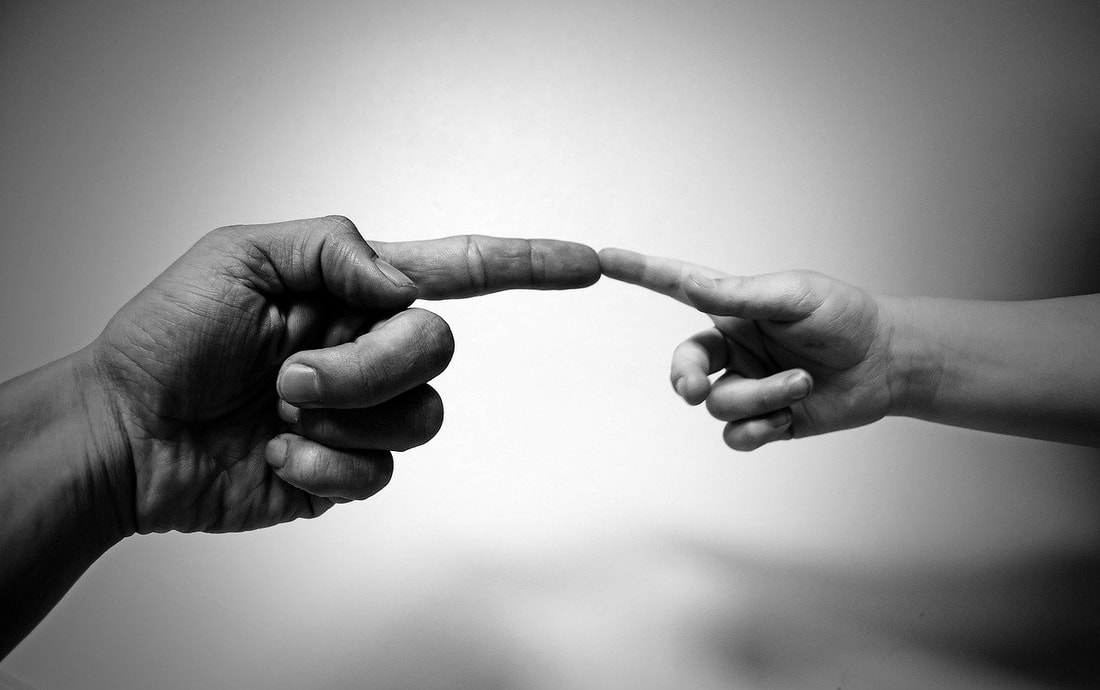|
Reflections from a home front: 3 With so many of our day-to-day encounters now at a respectful physical distance, or online, we’ve been forced to remodel our communication with family, friends and work colleagues. And it’s making me think about the effects on our individual and collective flourishing. For some, the enforced isolation means complete loss of physical touch – and our human need for touch is well researched. If, as babies, we are not cuddled and held, we fail to thrive; as adults, receiving a simple touch on the arm can lower our blood pressure and release the happy hormone, oxytocin. (I’m very aware that many people lack this near-necessity – with or without social distancing.) Although there’s no substitute for human touch, it may be that the voice can play a vital and vitalising part. The spoken word can be almost tactile in its effects. And as radio dramatists know, the voice in the ear can create a powerful sense of intimacy. Social researcher William Condon observes how the speaker’s thoughts are translated into muscle movements and then into airwaves that make the listener’s eardrum vibrate in absolute synchrony – so that ‘we’re almost in auditory touch’. There’s an ancient connection between human speech and touch. For early humans, close relationships among social groups were important and bonds between individuals were maintained through lengthy one-to-one grooming. But it’s thought that when the groups became too large for everyone to spend time grooming everyone else, speech (or, more likely, a kind of song) emerged to fill the gap. [1] Perhaps now, as the friendly handshake and reassuring touch are off-limits for all but the cohabiting, the voice might help to fill the current gap. In a reinvigoration of the old BT campaign, we might find ‘it’s good to talk’. These are all notes to self. Perhaps it’s because I’m rather an intravert, I’ve always found it strangely difficult to pick up the phone. Even more strangely, I almost always find that in the event, a tele- conversation is relatively easy and often rewarding – but never seem to learn from this. I think it’s initiating a possibly unwelcome interruption that I find so hard. The husband, a natural and enthusiastic phoner, clearly thinks this is wilful madness. But it’s so much more comfortable to type an email. I know where I am with writing. In the last few days, however, with the current situation as a safe pretext, I’ve been braving some phone calls. Admittedly, I’ve begun with people who I know are more used to phones than computers – but it’s a start. And actually it has been wonderful to connect and reconnect with friends. (There is of course the whole new world of video calling, but that’s for another reflection.) I’m reminded of Robert Macfarlane’s lovely etymological exploration of the word tact, which, as he points out, is at the root of both tactful and tactile. Tactful language, then, would be language which sings (is lyric), which touches (is born of contact with the lived and felt world), which touches us (affects) and which keeps time – recommending thereby an equality of measure and a keen faculty of perception. (From Landmarks, 2015) So today’s poem is a reflection on the tactile voice that can stroke our hands and our hearts. You can have an actual voice by clicking on the play button. Touching words
‘Yes’ – a spoken word; This tactful hand of mine. ‘It’s tough!’ – the teasing line; Playful punching on your arm. ‘I know’ – the lovely charm Slips across your shoulder. ‘My love’ – a touching whisper; A kiss so softly blown. ‘I am here’ – the steady tone; The blessing on your brow. Notes 1. A friend has asked, quite rightly, well how would anyone know? A lot of the research has been done by Robin Dunbar, and he gives a fascinating an accessible account in The Human Story (2004).
0 Comments
Your comment will be posted after it is approved.
Leave a Reply. |
AuthorStill me … Archives
September 2020
Categories
All
|

